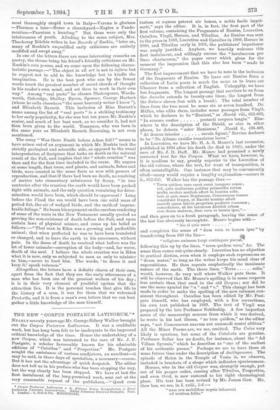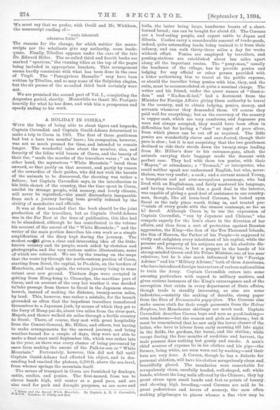THE NEW " CORPUS POETARUM LATINORUM."* NEARLY seventy years ago
Mr. George Sidney Walker brought out the Corpus Poetarum Latinorum. It was a creditable work, but has long been felt to be inadequate to the improved critical knowledge of the time. Hence the undertaking of a new Corpus, which was intrusted to the care of Mr. J. P. Poatgate, a scholar favourably known for his admirable editions of "Catalina" and " Propertius." Mr. Postgate sought the assistance of various ooadjutors, an excellent—it may be said, in these days of specialism, a necessary—course. But it has not the advantage of quick despatch. The editor does not tell us in his preface who has been stopping the way, but the way clearly has been stopped. We have at last the first instalment, of the long-promised work, sent out at the very reasonable request of the publishers,—" Quod cum • comas Postarum Lathe-elm a do Aiiisqua Dem Reenpniterum et Brovi Leationum Varistate instrueterum. Rdidlt Johannes Percival Postgate. Faso. Londini ; G, Boll of Fit. MDCOOECIIII, iustum et aaquum peteret uir bonus, a noble facile impet- ravit," says the editor. It is, in fact, the first part of the first volume, containing the Fragments of Ennius, Lucretius, Catullns, Virgil, Horace, and Tibullus. As Ennins was sent to the press in 1888, Lucretius and Catullus in 1889, Horace in 1890, and Tibullus early in 1891, the publishers' impatience was amply justified. Anyhow, we heartily welcome this first instalment, and willingly excuse the " involucrum pro lineo chartaceum," the paper cover which gives for the moment the impression that this also has been "made in Germany." The first improvement that we have to note is the inclusion of the fragments of Ennius. To leave out Ennins from a collection of Latin poets is much the same as to leave out Chaucer from a collection of English. Unhappily, we have but fragments. The longest passage that survives to us from the Annales extends to twenty-one lines ; the longest from the Saturx eleven (but with a break). The total number of lines from the two must be some six or seven hundred. Dr. Muller, who edits them, includes some passages from Virgil, which he declares to be "Enniani," as .Eneid viii,, 652-662, " In summo custos protecti corpora longis." Else- where in the description of the Shield, as also in other places, he detects "color Ennianus." 2E aeid ii., 486.499, "At domus interior oscula figunt," Servius declares to be "De Albano exoidio translates locus." In Lucretius, we have Mr. H. A. S. Munro's last recension, published in 1886 after his death (he died in 1885), under the care of Mr. J. D. Duff. Mr. Munro had promised a newly corrected text for the Corpus. What we have, however, is, it is needless to say, greatly superior to the Lucretius of the old volume, where the text, for want of transposition, is often unintelligible. One instance that may be conveniently cited—many would require a lengthy explanation—occurs in. ii., 652-659. Walker has the passage thus :— " Terra quidem vero caret omni tempore seem; sed, quis multarum potitur primordia rerum multa modeis multeis (Alert in lumina soils. heic si quis mare Neptunutu, Cereremque voeare constituet fruges, at Bacchi nomine abuti mavolt quam latieis proprium proferre vocamen ; concedamus, ut he terrarum dictitet orbem ease deum matrem, dum vera re tamen ipse,"— and then goes on to a fresh paragraph, leaving the sense of the last line obviously incomplete. Munro begins with- " hie si quis mare ', and completes the sense of " dam vera re tamen ipse " by transferring from 680 the line- " religions animum turpi eontingere puce." following this up by the lines, "terra quidem vero," &o. The sense thus comes out quite clearly. Lucretius has no objection to poetical diction, even when it employs such expressions as " deum mater," so long as the writer keeps his mind clear of superstitions. He then repeats emphatically the inanimate nature of the earth. The three lines, " Terra soils," would, however, do very well where Walker puts them. It will be observed that Mr. Munro's spelling is in some respects leas archaic than that used in the old Corpus ; nor did he use the same symbol for "n" and "v." This change has been made in order to make the spelling of the new volumes con- sistent throughout. Clatullus has been edited by Mr. Post- gate himself, who has employed, with a few corrections, his own text published in 1889. The text of Virgil was prepared by the late Professor Nettleship. A few imperfect notes of the manuscript sources from which it was derived, he wrote in his last illness, " no tum quidem," as the editor says, " aut Camenarum suarum ant commodi nostri oblitus." All the Minor Poems are, we see, omitted. The Culex very likely is spurious, but some of the Catalecta are genuine. Professor Seller has no doubt, for instance, about the " Ad Villam Syronis," which he describes as " one of the earliest of his authentic poems." Perhaps we are to have these at some future time under the description of Antilegomena. The episode of Helen in the Temple of Vesta is, we observe, included in brackets of a shape which indicates spuriousness. Horace, who in the old Corpus was, strangely enough, put out of his proper order, coming after Tibullus, Propertius, and even Ovid, is now restored to his right chronological place. His text has been revised by Mr. James Gow. Mr..
Gow has, we see, in I. xxiii., 5-6 :— " nem sou mobilibus uepris inhorruit ad uontum foliis."
We must say that we prefer, with Orelli and Mr. Wickham, the manuscript reading of- " veris inhorruit aduentus foliis."
The reasons for the change, for which neither the menu- smipts nor the scholiasts give any authority, seem inade- quate. Finally, Tibullus appears under the care of the late Dr. Edward Hiller. The so-called third and fourth books are marked " spurious," the running titles at the top of the pages being included in appropriate brackets. This arrangement seems hardly consistent with what has been done in the case of Virgil. The " Panegyricus Messallre " may have been written by Tibullus, and so may some of the Sulpioian elegies, but the six poems of the so-called third book certainly were not.
We are promised the second part of Vol. I., completing the Augustan period, shortly. Meanwhile we thank Mr. Postgate heartily for what he has done, and wish him a prosperous and speedy ending to his work.



































 Previous page
Previous page